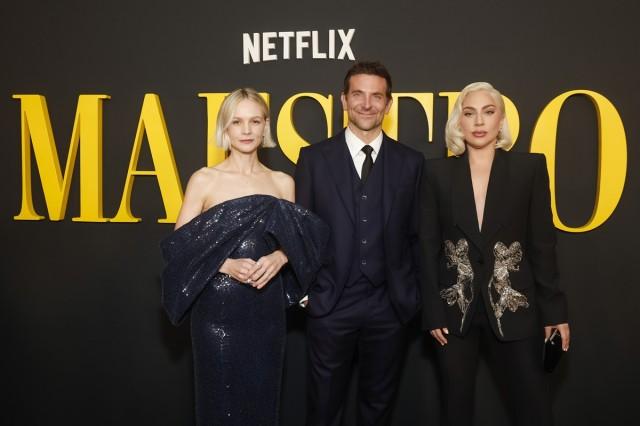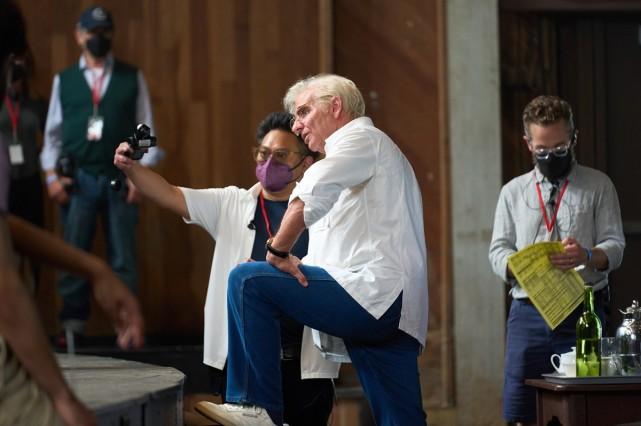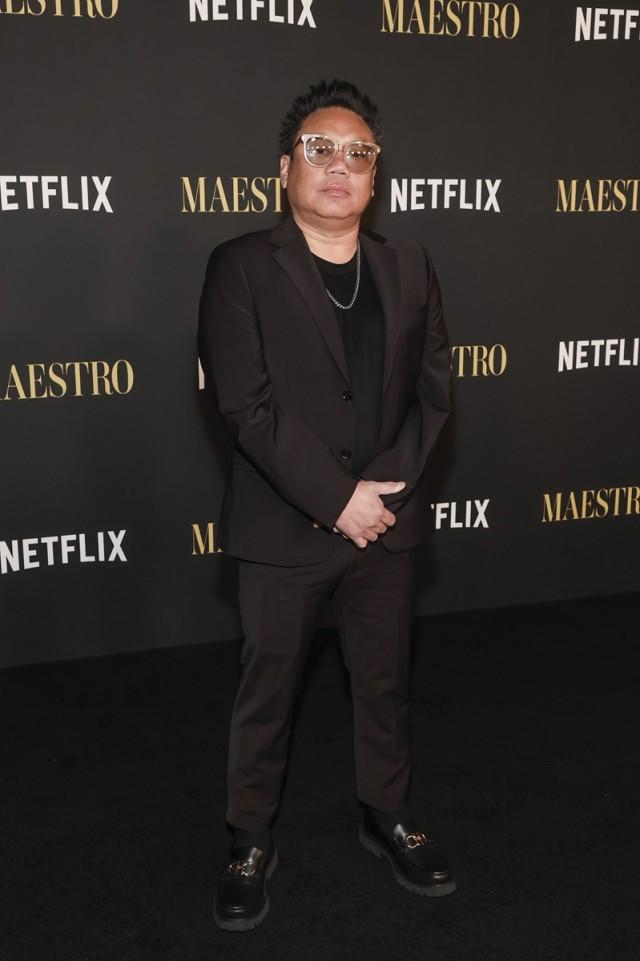Matthew Libatique on his second collaboration with Bradley Cooper in 'Maestro'

We were able to catch the award-winning Filipino-American Director of Photography and cinematographer Matthew "Matty" Libatique in Los Angeles before he headed back to New York, where he is based.
"I'm actually in Los Angeles for a few days and then I go back. I'm doing a couple of commercials here and then I head back to New York for the holidays," the boyish 55-year-old lensman with his signature spiky hair said as we interviewed him via Zoom from his hotel room. He also had a few minutes left before he joined Bradley Cooper, Carey Mulligan, and other members of the cast and crew of the biopic "Maestro" for the LA premiere of their movie.
"Maestro," which was helmed by Cooper, is a biographical drama on the life of the famous Jewish American composer Leonard Bernstein (portrayed by Cooper) and his complicated marriage to his equally famous Costa Rican actress-wife Felicia Montealegre (Carey Mulligan).
Garnering four Golden Globe nods—Best Motion Picture-Drama, Best Performance by a Female Actor in a Motion Picture-Drama for Mulligan, Best Performance by a Male Actor in Motion Picture-Drama for Cooper, and Best Director-Motion Picture also for Cooper—the movie is the second collaboration for Cooper and Libatique after they did the 2018 musical romance drama "A Star is Born" with Lady Gaga. Libatique was nominated for an Oscar in 2019 for Best Cinematography for the film.
Cooper, on the other hand, could be the first person to ever be awarded for both Best Director and Best Actor for the same film. He was previously nominated for Best Director and Best Actor for "A Star is Born." Others who have been nominated for directing and acting categories for the same film have included Woody Allen, Warren Beatty and Barbra Streisand.

Gold Derby predicted that "'Maestro' will score double-digit Oscar nominations." They wrote of the critically acclaimed film, "Netflix's 'Maestro' is out on the streaming service this Christmas and the period film will surely delight film lovers and movie fans alike. Bradley Cooper's Leonard Bernstein film isn't an ordinary biopic as it dispenses the tired cradle-to-grave true story trope to focus entirely on Bernstein's marriage to Felicia Montealegre (Carey Mulligan). The film spans decades including the 50s, 60s, and 70s, and each part of the film is made in the style of filmmaking used in said period. This makes for a wonderfully visual spectacle with the sets, costumes, and hair and makeup all some of the best work in each area of filmmaking. Add to that excellent acting from Cooper and Mulligan as well as top-tier directing, cinematography, and editing and you've got an Oscars hopeful that could reap bids in multiple categories."
It is, in fact, one of those movies that we just had to see again.
So how was it working the second time around with Cooper, we asked. How different was the experience the second time around?
"It was a little more intense," Libatique said. "'Maestro' is a film of complexity because of the musical sequences, and how the music was handled, but it was also the fact that we're covering a very intimate story between this marriage, these two people, and everything that transpires between them over a lifetime.
"So, there's a lot of internalized, beyond the filmmaking, working with Bradley, you're working with this amazing actor as well. To his credit, he can direct and act. He could act and direct within a scene. But we had some pretty high aspirations for the film. So, it was a little different.
"'A Star is Born' was the first time he was making a film and the first time we worked together, and it was a little looser. It was more about, honestly, it was so much about Lady Gaga at that point. Here, it was just this. Bradley being in the make-up chair for so long at the beginning of the day so that he could be ready for me when I arrived so that we could work on the shots together was a tall task for the man. And the job he did, I can't say enough. It was remarkable to watch."
Libatique added that Cooper has grown as a director.
"He's so decisive," he revealed. "I mean, he was decisive on 'A Star is Born,' but from my standpoint, he's become so much more familiar with optics and lensing, which is helpful, because we can speak the same language when discussing shots and how we want to construct the scene. He's always had an instinct towards efficiency in shooting and not wasting a performance, but he's just honing those skills even further as well.
"He's becoming a really strong filmmaker and he's developing his voice. I think he's developed his voice. And I think the beauty of working with him is that he's continuing to change. I don't think he's ever going to rest. I think he's always going to try to get better."
 We pointed out to Libatique that one of the boldest scenes in the movie was that black-and-white dream ballet scene. How did he collaborate with Cooper on that?
We pointed out to Libatique that one of the boldest scenes in the movie was that black-and-white dream ballet scene. How did he collaborate with Cooper on that?
He explained, "One thing that impressed me when I first read the script was how he wrote the transitions. And, that scene begins at the luncheon with Koussevitzky, his mentor at Tanglewood, where Koussevitzky is telling Leonard Bernstein that he should drop the Stein in his name and just go with Leonard Bern.
"To which, Felicia responds that she wants to see all the music that he's criticizing from like, 'Westside Story' and all the stuff he does for musicals, and they take off. And that transition starts with a shot, a camera of kind of a God POV, pulling them away from that table, and then pulling them down an aisle inside the St. James Theater onto a performance of 'On the Town.' And that was all written.
"They were all conceived already in his mind. We shot this whole scene, that whole sequence, up until they're in the bedroom again at Tanglewood, we shot in sequence. It was like building a brick wall. Okay, this piece, this piece, this piece. Maybe a little more artistic than that, but it was a tall task to achieve."
The movie, which was also filmed in the stunning Ely Cathedral in Cambridgeshire, England, was quite an experience for Libatique who admitted that it was terrifying. He disclosed, "Ely Cathedral was interesting because I don't think I've ever shot in a space that big. The idea of lighting it was quite terrifying when I first walked into the space. Luckily, I had this amazing crew who do this for a living, and from the great UK film industry, and they had my back, and I just took suggestions, to be quite honest.
"I had some ideas, but I just trusted the people who had done it before in a space like that. I was able to concentrate more on the things Bradley needed, what Lenny needed, which is like a freedom of movement and a broad lighting style that would accommodate the mass of people that were on the stage.
"Ely probably marks one of the highlights of my career in that listening to the London Philharmonic play Mahler's 2nd in the front row of a cathedral church was astounding. It stopped me. When I sat down, I couldn't do anything else. I put the phone away, I stopped working, and I just listened. It just sort of carried over into the shoot.
"That performance that you see in the film, I've seen this man perform, but he gave a great performance at that moment."
Not everybody also gets to shoot inside the Bernstein family home and Libatique recalled that it was like shooting in a sacred space.
"In terms of shooting the family home, shooting it in Fairfield was a treat," he revealed. "At first, we were nervous about walking in with equipment. It felt sacred, this space. It's like we went to Bernstein's vacation home. But as soon as we arrived, and I think a lot has to do with Bradley and a lot has to do with the family, I felt like we were welcome. I felt like the equipment was welcome. I think that the creative endeavor was welcome. So, I think that epitomizes the man."
Being surrounded by the London Philharmonic Orchestra most of the time during the filming was also very memorable for him.
"The funny thing is they would watch us, and we would watch them. So, they were as intrigued by what we were doing as we were intrigued by what they were doing. It felt like mutual respect. But it's hard because I don't find what we do very interesting, maybe because I do it for a living, but they sure seem to. In between takes, they'd watch us while we were setting up. But anytime you can collaborate with great artists I think you're going to be better for it."
Libatique confessed he didn't know that much of Bernstein." I knew he was a conductor, but I wasn't aware of his composition. He conducted some of the greatest pieces of music ever in front of huge audiences. He was a great American conductor, if not the greatest American conductor. He was a huge celebrity. He might as well have been the Michael Jackson or Elvis Presley of his time, of pre-rock and roll. I knew this were the words of a famous man, but I didn't know the extent of his musical prowess until I started making it."
But Libatique pointed out that "there's a lot of that in the screenplay there were a lot of musical cues that were written in. So, I was listening to that, listening to those. And venturing off what I knew about him leading up to the film before Bradley introduced the idea of shooting this film."
 We told him that we saw the movie during the recent Venice International Film Festival where it had its world premiere. At that time, there was still a SAG strike. Libatique didn't go to Venice. Did he just watch the premiere on TV?
We told him that we saw the movie during the recent Venice International Film Festival where it had its world premiere. At that time, there was still a SAG strike. Libatique didn't go to Venice. Did he just watch the premiere on TV?
"I didn't pay attention to it. I was working. We'd been on strike; I have to work. Instead of promoting movies while people decided to go on strike, I decided to continue to work and watch out for myself and my family. That's why I didn't go."
Libatique said he was also lucky to have spent some time talking to filmmaker Steven Spielberg who was one of the producers of the movie together with Cooper and Martin Scorsese.
'I met the man, and it just blew me away. He's one of the great filmmakers of our time. Coming around that kind of creativity, you're better for it. Just having a conversation with him on set regarding black and white photography was like kind of a dream come true."
He also recently worked with his good friend, filmmaker Darren Aronofsky on his film "Postcards From Earth" in Las Vegas.
He said of that experience: "It was so much about the new technology. Being inside the Sphere, there was a vision there. A pretty strong vision that's remarkable. And when you walk into this space, you're instantly wowed by it. Darren did a great job coming up with a concept that could fit within this technology in its newest form. It's going to be interesting in the future to see how that evolves into what kind of storytelling this format is going to allow. But it's massive and it's all-consuming. You sit there and you're completely surrounded by the image and it's pretty intense. And it was nice to be a part of it. I learned a lot."
As for his future projects, he simply replied, "Right now, I'm prepping a film. I can't talk about it, but I'm prepping a film in New York."
—MGP, GMA Integrated News




